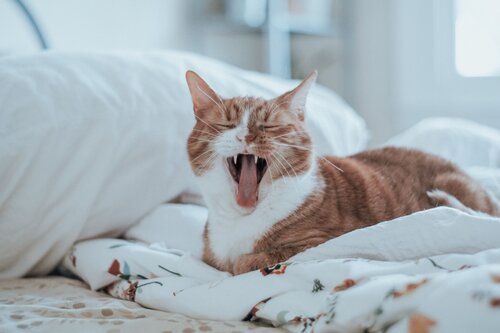Here is our second blog on Pet Dental Health, where we will discuss methods to prevent periodontal disease, caudal stomatitis, tooth resorptions, and/or oral cancer in cats. Some of the methods discussed in our previous blog on dog dental health do not always work for cats. And we want to provide the best care for our pets and talking teeth is up there on importance, right? Right! What is your cat’s dental cleaning routine? Do you brush their teeth?
Our cat’s dental health is not often discussed or thought about until the veterinarian mentions cleanings and extractions. Periodontal disease is present in 70% of cats older than three years of age. Since, cats are experts at masking when they are ill or in pain, even more so than dogs. They learn to adapt to the pain over time and we have to look for signs of their discomfort. Dropping food, head shyness, lack of self-grooming, chewing on odd objects and/or anorexia are just some of the symptoms your cat may experience when they are in extreme pain.
Leaving the cat’s dental health to the veterinarian for their yearly teeth cleanings is only part of the solution. Just like humans and dogs, brushing your cat’s teeth is the number one preventative measure to take against tartar buildup that causes all sorts of periodontal diseases. If you have a kitten, this is easier because they easily adapt and are receptive to brushing their teeth. However, older cats will require a bit of patience on the pet parent’s side, and may take up to two months to introduce them to this new habit. Each cat in your household will require their own toothbrush and replace their toothbrush when you change your toothbrush. They have lots of different toothpaste flavors made from seafood to poultry that will entice your cat to enjoy this new brushing routine. If this is something new to you, contact your veterinary office to schedule a meeting with a vet technician to demonstrate the proper method to brush their teeth. Importantly, if you have an older cat, check with your veterinarian before starting any new brushing routine. Your cat could have tartar build up or maybe a chipped tooth to work around. The veterinarian will advise you on the best safe practices for brushing your cat or maybe suggest using wipes.
If brushing their teeth feels daunting, then there are wipes on the market that can be substituted for brushing. Gauze and cotton balls with toothpaste also work too. This may need to be introduced slowly. Do check with your vet before starting any new dental routine with your pet. Gels and oral rinses are available to purchase, but cats usually are more disapproving of this even when they are flavored.
Check out this chart from the Veterinary Oral Health Council their recommendations for brands.
https://www.vohc.org/VOHCAcceptedProductsTable_Cats.pdf. Better to be prepared with knowledge on what is out there and get their opinion on which they see the best results from. Your veterinarian may have other brands to suggest. Majority of the products listed do require a prescription.
Dental chews, treats and/or special food for cats do not have the same affect on their teeth as it does for dogs. It is best to leave the decision to feed your cat dental food to your veterinarian. Dental food is rarely needed and only when your pet absolutely requires it.
Remember to follow us on Facebook, Instagram, Pinterest, and LinkedIn to be in the know on all things Platinum Paws Pet Services. Next month, we will spotlight a new soon to be non-profit business, Fetch Thrift Shop in Boonsboro.
Sources:
Cat Care Center of Baton Rouge : https://www.catcarecenter.com/services/cats/cat-dental-care
Veterinary Oral Health Council : https://www.vohc.org/pet_dental_health_month.html
VCA Animal Hospital : https://vcahospitals.com/know-your-pet/cat-care/promoting-wellness/cat-dental-care-and-hygiene



0 Comments